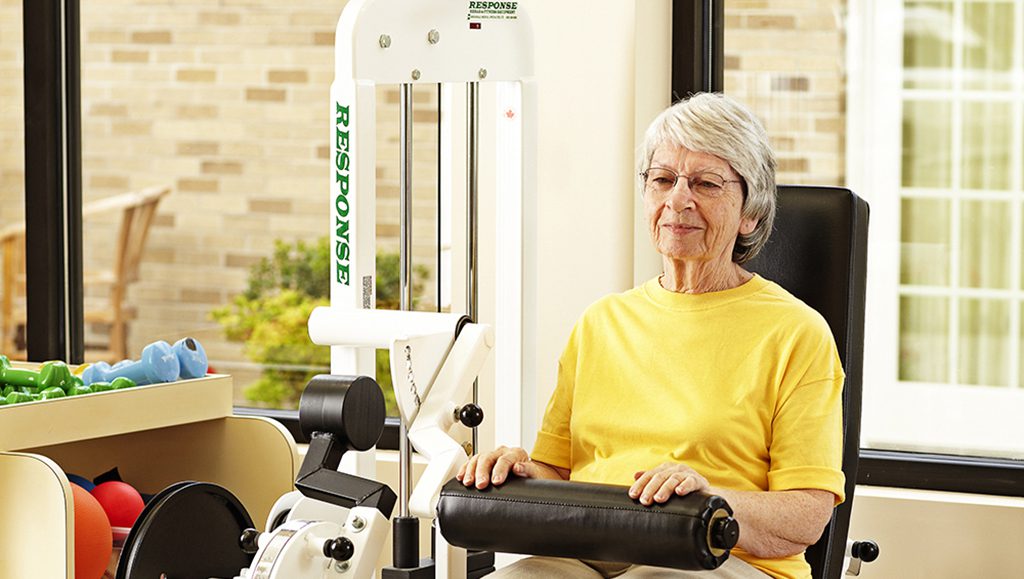The aging process is natural. If you have an elderly loved one who is inactive, or even a loved one residing in a senior living community or nursing home who typically sits all day, it’s important to encourage them to get moving and to avoid a sedentary lifestyle. Seniors who don’t incorporate physical activity into their daily routines are losing essential health benefits and putting their overall health in danger.
Below are a few health issues inactive seniors can expect, as well as prevention methods:
Bone loss
Bone loss is common in the elderly population, but inactivity accelerates the risk. Lack of exercise or physical activity results in the loss of bone mineral, which makes the bones more brittle and susceptible to fractures. Some useful exercises for strengthening bones include walking and weight-bearing exercises for the legs, shoulders, back and biceps.
Depression
Research has shown that there is a strong correlation between exercise and mental health. After a few minutes of exercise, endorphins are released and interact with receptors in the brain that elevates one’s mood. Exercise is just as effective as medication in reducing the symptoms of mild-to-moderate depression too.
Loss of Muscle Mass
At 75 years of age, approximately 50 percent of an individual’s muscle mass has vanished. Regular exercise can delay muscle loss and strength. Aerobic activities, combined with strength-training exercises twice a day can maintain bone density; improve balance, coordination and agility; reduce the risk of falling; and promote more independence in daily activities.
Diabetes
In the U.S., one in four individuals over the age of 60 has diabetes. Genetics, aging and a sedentary lifestyle all contribute to the cause of diabetes, but the good news is that seniors living with diabetes can manage the disease. Exercising a few times a week can significantly improve the body’s use of glucose, as well as improve blood pressure, cholesterol and stress levels. It’s important to check with your doctor before starting an exercise program.
The Maplewood Difference
Staying active is key to vibrancy of life for seniors. At The Maplewood, our residents enjoy special events, exciting outings and a full program of daily activities. Residents play a key role in creating our monthly recreational calendars and extended family members are always encouraged to participate.
Active living at The Maplewood means experiencing a dynamic program of recreation based on your preferences, as well as concierge-level service to help you enjoy your day just the way you like.
“From the moment I stepped into the building, I could tell this was nothing like any nursing home I had ever seen. It wasn’t just the physical finishes and layout, it was the people. Everyone I met seems to sincerely care about everything in the building. You can tell the staff truly cares about people.”
– S. Waltz, family member of a Maplewood resident
Wellness and Exercise
Our physical therapy team focuses on achieving and maintaining the highest possible level of mobility, strength, range of motion, balance and flexibility for our residents. Our walking program is a collaborative effort between our therapy and nursing departments.
Our therapy department evaluates each resident and if appropriate, a walking program with detailed recommendations is incorporated into the resident’s care plan. Our nursing staff then implements the program using care techniques to ensure resident safety. We also offer Modified Yoga and Chair Chi, two forms of exercises that we offer in our wellness classes.
To summarize, check with your doctor before starting an exercise program. Regular exercise can delay muscle loss and strength. Some useful exercises for strengthening bones include: walking and weight-bearing exercises for the legs, shoulders, back and biceps. Aerobic activities, combined with strength-training exercises twice a day can:
- Maintain bone density
- Improve balance, coordination and agility
- Reduce the risk of falling
- Promote more independence in daily activities
Contact Us
If interested in learning more about The Maplewood or would like to participate in a virtual tour, contact Lynn Pierce, social services director, at (585) 872-1800, ext. 4022.



